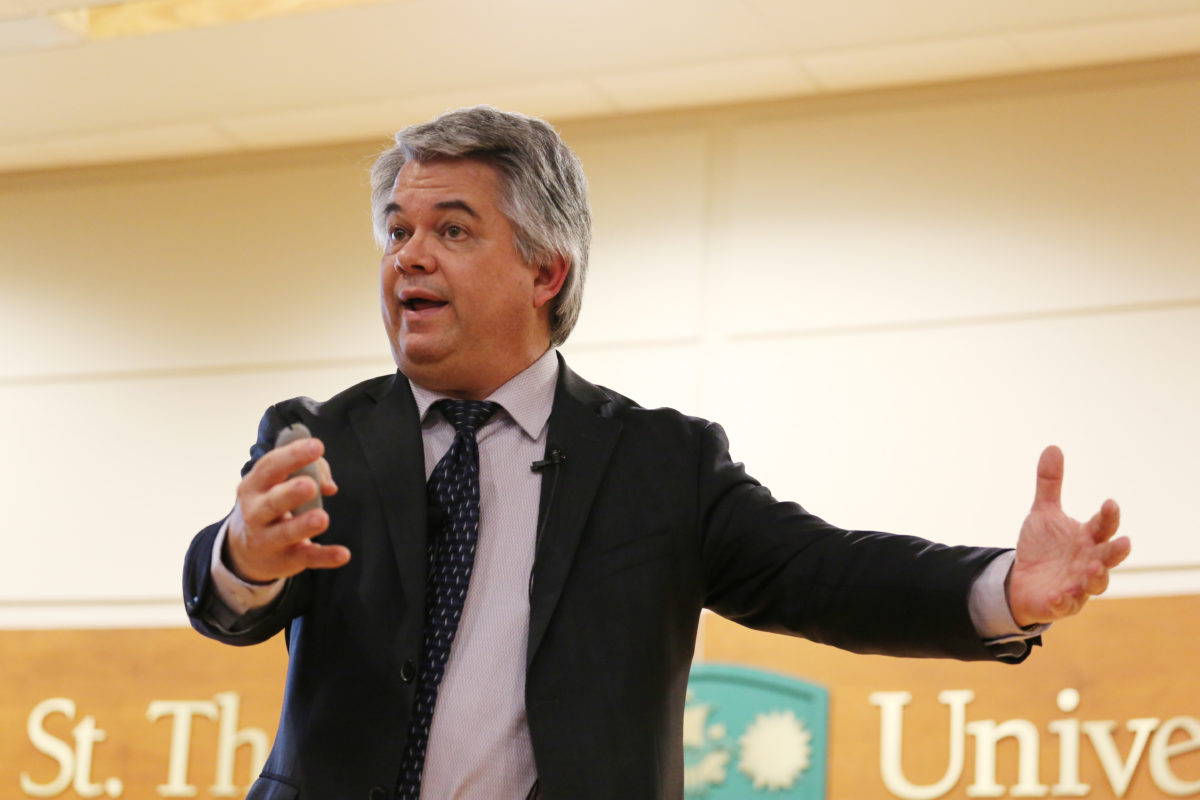
Climate change is happening and what we need to do is prepare for the inevitable. That’s the message Blair Feltmate had for attendants to his lecture last Wednesday.
“Climate change is real. Climate change has happened, is happening, and will continue to happen.”
Feltmate is a professor at the University of Waterloo and the head of the Intact Centre on Climate Adaptation. He holds a Ph.D. in theoretical and applied ecology, a Masters in zoology, a Masters in sustainable development, and was national Sciences and Engineering research council post-doctoral fellow.
Feltmate spoke about climate change but specifically, property and causality insurance, flooding, and practical ways that Canada can adapt to climate change and prepare for the future. Feltmate was adamant throughout his lecture that the time to do something about climate change is right now.
“We need to build a weather ready nation right now. We need to build a weather ready Canada now. Not 25 years from now, not 50 years from now, not 75 years from now. We have a formidable challenge on the table, as of this moment.”
Much of Feltmate’s lecture focused on flooding since it is the most prominent climate change effect in Canada. He talked talked about the importance of flood maps so that cities are able to plan in advance for extreme weather events. However, when these events occur and homeowners wake up to find three feet of water in their basement, their first call is to their insurance company.
“If any industry is on the forefront of addressing the challenges of climate change it’s the insurance sector. They’re not the canary in the coal mine, they’re the ostrich in the coal mine in terms of that being hit by climate change. Effectively the challenge that this industry is facing is a metaphor overall for the challenge that Canadians are facing.”
Feltmate proceeded to speak about how global temperatures have gone up 1 C. Many people think that one degree is not a big deal. However, Feltmate reiterated the scale of global temperatures.
“The difference in temperature on the planet today versus an ice age is about 6 to 7 C.”
Feltmate brought up was that if we are going to continue to burn fossil fuels on our planet, knowing the effects of this, how we plan on adapting and prepare for climate change will be key. Feltmate encouraged adaptations such as, designing infrastructure strategically with future extreme weather events in mind.
Feltmate also commented on the recent COP21 conference. He believes that as a global community we are taking the wrong approach to decreasing global climate temperatures. Feltmate thinks that instead of each country setting targets, we should be pooling our resources and finding out in which places we can get the most “bang for our buck” in decreasing global temperature.
“If it were me, and let’s say we had Canada looking to spend $50 million to lower greenhouse gas emissions through some technology related to oil sands in Alberta. If it turns out that that same $50 million could be spent in Costa Rica and lower twice the level of emissions that we might realize in Alberta, and given given the emissions in the global common,” said Feltman. “Why aren’t we deploying that money somewhere else, to get twice the bang for the buck? Because at the end of the day what we want is less CO2 in the atmosphere.”
Feltmate spoke about a variety of specific areas within a colossal global issue. However, the overall message was clear. The time to act on climate change was yesterday, a change needs to be made now.
Feltman said we need people to focus their energy on fixing this crisis, instead of working strictly for the buisness world
“Somehow, really smart people at Tim Horton’s have figured out how to influence the behaviour of the masses, such that they can draw these people in. It’s almost, how do we take that same creativity, that creative mindset and apply it to real problems.”
